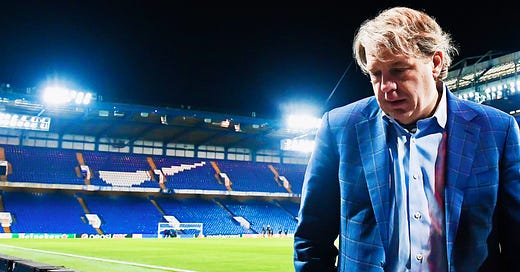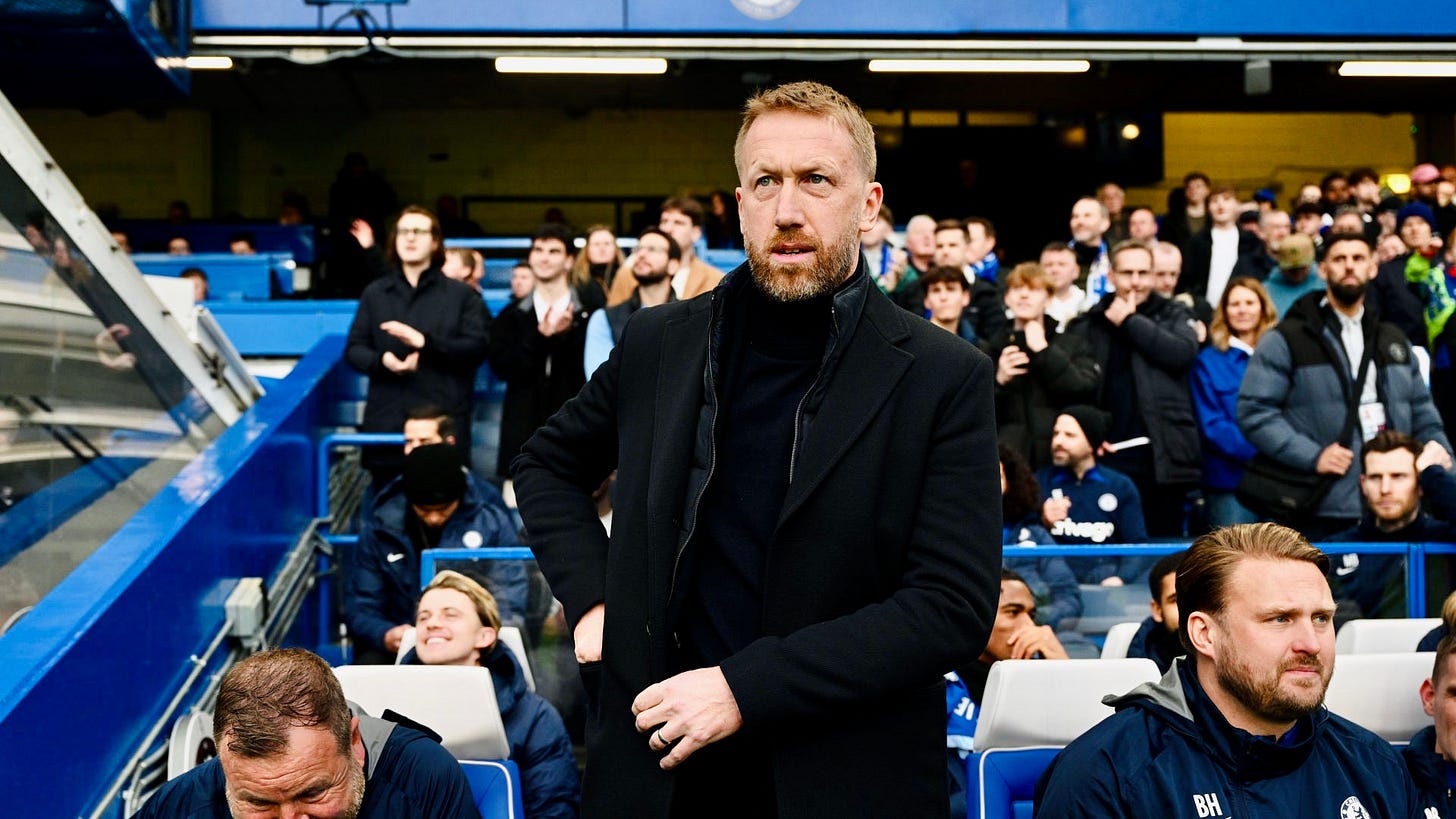The satisfaction Chelsea provide me has little to do with what happens on the pitch. Days of cheering when goals were scored or seething when conceded have long since died. As written previously, Chelsea are more an anthropological and sociological exercise for me. The distance is something I chose, so I’m at peace. It provides room to see things others miss.
My primary enjoyment comes from deducing what is likely to happen based on my knowledge of the game, the club, and patterns of behaviour shown by players, coaches, and board members.
When Chelsea was sold last May from Roman Abramovich to a consortium led by Todd Boehly and Behdad Eghbali of Clearlake Capital, the first thing of consequence I suggested was the sacking of Thomas Tuchel. Not for any cause the German would create, but my understanding of how sports owners from the United States operate. They prefer handpicking those in positions of power. Tuchel was Abramovich’s man, thus the simplest way for Boehly and Clearlake to assert themselves was sacking him for someone new.


Winning Chelsea their second Champions League in 2021, Tuchel was loved by supporters (and if not loved, respected). Due to that connection, I felt the dissonance of immediately ousting the German would be far too great. An opportune time was needed to justify the play.
Signing seven new first-team players in the summer, and removing pieces at board level who worked with Tuchel—principally technical advisor Petr Čech and director Marina Granovskaia—created a faulty foundation. Without a support system, the structure was bound to collapse on Tuchel.
One month into the season, Boehly and Clearlake found their moment when Chelsea lost to Dinamo Zagreb on September 6th. Tuchel was sacked as head coach the day after, and in less than 24 hours Brighton and Hove Albion’s Graham Potter was announced as his replacement.

The timing was off.
Tuchel could be sacked, sure. Chelsea weren’t playing well. They had seven points from a possible 18 in the Premier League, and Zagreb wasn’t an ideal beginning in Europe, but having his replacement so swift seemed staged, as if any reason to remove Tuchel would suffice so long as the person desired was the one hired.
I felt my suspicions confirmed when transfer journalist Fabrizio Romano suggested during the signing of Brighton left-back Marc Cucurella, Boehly was “informed about [Potter’s] ideas already in August when he negotiated…for Cucurella.” Were Romano’s information accurate, Boehly bought Chelsea thinking at least one step ahead. Their plan seemed to be sack Tuchel when politically expedient and get Potter.
That line was followed.

I’m unconvinced anyone rising from Brighton is ready for the expectations Chelsea supporters hold. Abramovich created a behemoth. This isn’t like Ken Bates’ stewardship—when the occasional cup run and playing spoiler to England’s top three teams was acceptable—the club is now conditioned to win.
Thrown into the deep end, Potter can’t be blamed. The 47-year-old was offered the post by an ownership group who thought him capable of growing into the position. What Boehly failed to account for was growth takes time, and time is hardly afforded at elite football clubs.
Bad seasons for American teams can be sold. Concessions exist to create competitive balance (e.g. draft picks or increased salary caps). That balance is nonexistent in football. If allowed, things get perpetually worse because there is no bottom. Fans inherently understand this nature, creating a despair and anxiety uncommon across the Atlantic.
As it became obvious Potter was struggling to stay afloat, the tension rose: How long can an inexperienced ownership allow their hand-picked man to tread water before drowning? It was an interesting case in the tolerance fans have when presented with owners willing to let them suffer for some combination of pride and potential.


Losing 2-0 against Aston Villa last Saturday was the breaking point. Removed two days after the defeat, Potter took his chance leaving the relative comfort of Brighton, as did Boehly sacking a known entity in Tuchel, and both failed.
The search for a new head coach is ongoing.
Luis Enrique, Julian Nagelsmann, Luciano Spalletti, and Mauricio Pochettino are some of the shortlisted names via Sky Sports’ Melissa Ready, but additions seem to arrive every time the news cycle refreshes. I safely assume few know anything when the ownership don’t know what they are doing. It is like predicting the wind. A general direction may be determined, but gusts cannot be.
[Added: The latest gust seems to be Frank Lampard making an improbable return on an interim basis, via The Telegraph’s Matt Law.]
I would normally finish around here, but I need shelter for an unfinished thought.
Of Mice and Men (1937) by John Steinbeck is an analogy I’ve held back. It had potential, but required Potter’s removal to be voiced.
The story centres around the relationship between two men, George and Lennie. George is tasked with caring for Lennie who is mentally handicapped. Lennie is well-meaning in most instances but is big and doesn’t know his own strength—having the propensity to hurt people and animals. George’s job is making sure that tendency doesn’t get Lennie (and him) in too much trouble as they go about their adventures.
Fair warning: I am going to spoil the novella.
The story climaxes with Lennie, unaware of his capacity to inflict punishment, breaking a woman’s neck by shaking her. In response, her husband forms a lynch mob to find and kill Lennie. Knowing the future, George is conflicted. He was meant to care for Lennie, but how far does care extend? For George, his answer was shooting Lennie—sparing him from being lynched, but ultimately failing to keep him safe.
A question found in most American literature classes: Did George do the right thing, was he justified, and could something else have been done to prevent the outcome? Read the story for better context, but such debates stick with me. My feeling was George made a sensible decision, even if morally objectionable. Lennie’s track record of mistakes was long and escalating. Only time stood between Lennie hurting or killing George accidentally, or getting the pair in deeper problems that would see both killed. Lennie was a liability. George removing him was callous and selfish, but not an unreasonable solution in the circumstance for a person of George’s modest intellect.
When observing Boehly and Potter I was taken back to those debates. Despite Potter seeming affable from afar, there comes a point when protecting someone or something means removing the relationship. Potter’s tenure was an injury capable of destroying Boehly’s Chelsea reign before it had a chance to start.
Steinbeck borrowed the title of his novella from Scottish poet Robert Burns’ “To a Mouse.” The quoted stanza read:
But Mouse, you are not alone, In proving foresight may be vain: The best-laid schemes of mice and men Go oft awry, And leave us nothing but grief and pain, For promised joy!
The analogy had nothing more than potential as when reaching the end I can’t get past what Burns meant by “best-laid schemes.” Did he mean objectively good plans, or what one believes to be good plans, whether objectively good or not?
Then, what would Steinbeck say as it relates to his work? That answer decides the effectiveness of the analogy, so I need a class of nerds with which to debate.
In any event, schemes have certainly gone awry at Chelsea. Only once have Boehly and Clearlake decided correctly, and that was removing the person anointed to lead their project; but you don’t get credit for attending messes of your own making. 🎯






